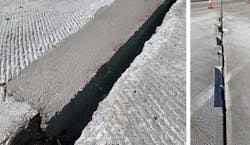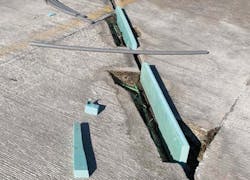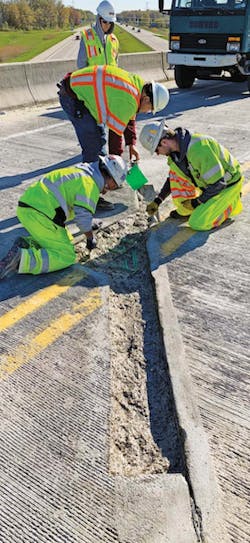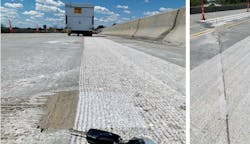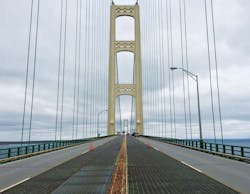The Michigan DOT (MDOT) is a leader in bridge preservation and actively addresses deck distress to extend the lives of their bridges. In 2019, MDOT was preparing to complete a bridge rehabilitation project including deck patching, thin epoxy overlays, expansion joint replacements, and pavement markings on 32 structures along I-94, one of the state’s busiest traffic corridors.
This corridor extends along I-94 to the city of Port Huron, the eastern terminus of I-94 and the second busiest of Michigan’s three international crossings. This includes high NAFTA truck traffic on the I-94/I-69 corridors.
Traditionally, deck patching would be done with a water-based concrete mix, which would require about 28 days to cure prior to allowing the polymer overlay to be applied. This process would also require two separate traffic control operations and two separate construction operations.
Reducing user delays on this busy stretch of highway was a priority for Michigan DOT. Time was also an important factor.
“With 32 structures, that’s a lot of patching,” said Jay Desai, Project Manager for C. A. Hull Company, the general contractor for the project. “You need to wait 28 days with regular concrete, so you couldn’t get it done in a year if you had to wait 30 days every time you did a patch.”
As a result, MDOT was specifically looking for a rapid setting polymer concrete patching material. “The corridor this material is being used on is a heavily commuted route, and mobilizing several different work zones throughout the corridor would have been frustrating for motorists, and both challenging and expensive for MDOT to maintain,” said Paul Schiefer, Bay Region Bridge Engineer at MDOT.
Finally, given the harsh conditions of Michigan’s winters, the department needed a patching product for polymer overlay projects that could hold up in cold temperatures and survive the beating of snowplows.
Patch and overlay in a day
Transpo introduced its T-17 methyl methacrylate (MMA) polymer concrete to the Michigan DOT in 2012. Designed for use on new construction and rehabilitation of bridge decks, expansion joints, bearing pads, and other concrete structures, T-17 polymer concrete is a 100% reactive, pre-packaged, two-component solvent-free material system.
While T-17 has been in use for decades, interest in the product has increased due to its ability to cut down on user delays. T-17 is also a permanent patch, eliminating additional costs from the need to redo patches. T-17 cures in less than one hour in a wide range of temperatures and requires no special equipment. As a result, partial or full-depth applications can be accomplished in a single pour.
The product was tested in St. Ignace in Michigan’s Upper Peninsula and used again on the Mackinac Bridge in 2015. According to Tom Donnelly, Midwest Regional Manager of Transpo Industries, staff have reported in each location that the T-17 outlasted the service life of water-based concrete materials. Staff at the Mackinac Bridge reported fewer patch failings than when they had used water-based concrete materials.
T-17 can be prepared for overlays by milling or shot blasting one hour after placement without debonding or damage unlike other patching materials. For MDOT’s most recent I-94 project, this meant the T-17 would allow the bridge deck patching and epoxy overlays to be completed the same day, instead of the typical 28-day period.
Weighing the costs and benefits of T-17 and the timeline of the project, C. A. Hull Company chose to use T-17 for bridge deck patching. Although the T-17 was more expensive than alternative options, Desai said the financial cost of purchasing the T-17 was weighed against the two-year timeline needed for regular concrete.
“It was cheaper to buy this than take an extra year to finish a job up,” Desai said. “To us, it was a pretty clear decision. If we were allowed to use it, that’s what we would be using.”
Work began in May 2019. Because of the fast cure time of the T-17, Desai said the crew was able to work on multiple bridges in a matter of days, limit the number of bridges closed at the same time, and avoid having to close the same bridge more than once.
“Now we can close a bridge, patch it, and the subcontractor doing the epoxy overlay can be there the same day,” he said. “We can prep two to three bridges and then do two to three bridges in a matter of a few days.”
Results
The bridges were completed in September 2019, despite a very rainy summer.
“We are pleased with how the product has been working,” Schiefer said. “It has a proven track record with our MDOT maintenance forces. Inclement weather is always an issue with placing polymer products on bridges, and this year has been remarkably rainy.”
Desai said he has been pleased with the workability of the product. “There have been no issues placing and finishing it,” he said. “I think people worry about concrete and the set up time, but this (T-17 Polymer Concrete) sets up fast and hasn’t been an issue.”
Desai added, “You can order a little bit more to be out ahead of what’s coming.” The product is mixed on site to the needs of the repair area.
Desai said no issues were reported with working with the product. “Tom Donnelly came out the first few times to use it, and we haven’t had a hiccup with it yet,” he said. “They really made an effort to support us to use the product right.”
